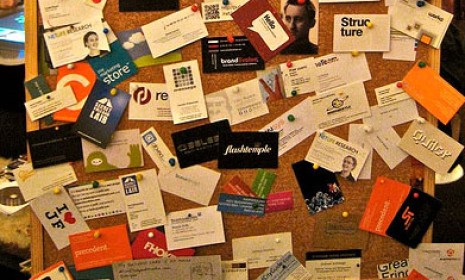Is the business card dead?
As more of our world moves online, some are questioning the relevance of the humble boardroom staple

A free daily email with the biggest news stories of the day – and the best features from TheWeek.com
You are now subscribed
Your newsletter sign-up was successful
With the advent of business-networking sites, smartphones, and cloud-computing, many are proclaiming the death of the business card. Once deemed as important as a firm handshake, the business card seems positively archaic in an era when you can share your entire resume with the swipe of a finger. But the card has its defenders, who say it will be a long time before that little piece of paper goes the way of the steam engine. Here, a guide to whether the ritual of swapping cards can endure in the digital age:
What is the main threat to the business card?
"If business cards were to die, the prime suspect" would be the business-networking site LinkedIn, says Roger Bennett at Bloomberg Businessweek. The site offers far more information than a card, and lends a legitimacy to your profile that a piece of paper can never match. The site also recently acquired CardMunch, an app that scans business cards and stores their information, "relegating the business card to a mere gateway to the social network."
The Week
Escape your echo chamber. Get the facts behind the news, plus analysis from multiple perspectives.

Sign up for The Week's Free Newsletters
From our morning news briefing to a weekly Good News Newsletter, get the best of The Week delivered directly to your inbox.
From our morning news briefing to a weekly Good News Newsletter, get the best of The Week delivered directly to your inbox.
Are there other companies like CardMunch?
A "veritable firing squad" of companies is racing to create the app that will "become Business Card 2.0," says Bennett. One company, Bump Technologies, created an app that allows people to exchange information by simply tapping together their smartphones. Deep Nishar, a senior vice president at LinkedIn, tells Fast Company that the whole point is to end "this decades-old technology" and make "the Rolodex obsolete."
Does the business card stand a chance?
Some say the business card "has a secret lo-fi strength" that no technology can replace, says Bennett. The business card is a personal expression of identity, while it's tougher to be unique on LinkedIn and other sites that recycle the same templates for every user. A business card, particularly a creative one, "is the first marketing effort" you make with clients, partners, and colleagues, says Speider Schneider at WebDesignerDepot.
A free daily email with the biggest news stories of the day – and the best features from TheWeek.com
Could the card make a comeback?
Possibly. Case in point: The design company MOO sold 50 million business cards in 2011, and plans to double that number in 2012. Explaining the company's success, MOO chief executive Richard Moross tells Fast Company, "The more connected to the web we are, the more precious the real world is, so it is important to make a connection." And MOO's customers aren't luddites and old men in fusty suits: One of its most high-profile partners is Facebook, which joined with MOO to create "Facebook cards" featuring users' Facebook Timeline Cover Photos and custom quotes.
Sources: Bloomberg Businessweek, Fast Company (2), WebDesignerDepot
-
 The Week Unwrapped: Do the Freemasons have too much sway in the police force?
The Week Unwrapped: Do the Freemasons have too much sway in the police force?Podcast Plus, what does the growing popularity of prediction markets mean for the future? And why are UK film and TV workers struggling?
-
 Properties of the week: pretty thatched cottages
Properties of the week: pretty thatched cottagesThe Week Recommends Featuring homes in West Sussex, Dorset and Suffolk
-
 The week’s best photos
The week’s best photosIn Pictures An explosive meal, a carnival of joy, and more